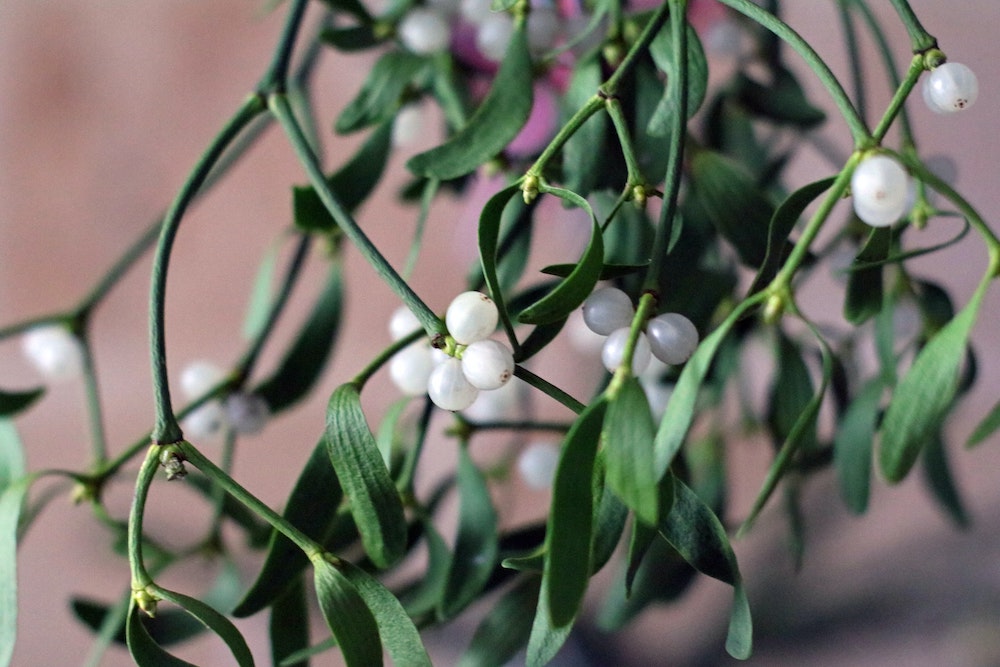Mistletoe's Prospective Medical Benefits

For centuries, the sprigs of mistletoe growing on trees in the winter have been associated with holiday cheer. As far back as Ancient Greece, the plant was seen as a symbol of love and fertility.
However, there may be more to mistletoe than its romantic symbolism - it also contains some promising medical benefits. Recent studies suggest that mistletoe could potentially treat cancer and other chronic illnesses.
In this blog post, we'll explore the potential medicinal benefits of mistletoe, how it is traditionally used in different cultures, and what it means for our understanding of the natural world.
What is mistletoe?
Mistletoe (Viscum album) is an evergreen plant used for centuries in traditional medicine. The mistletoe plant contains substances stimulate the immune system and kill cancer cells.
Mistletoe extract is used as a cancer treatment in Europe, where it is administered by injection into the bloodstream or directly into the tumor site. It is approved for treating breast, ovarian, and colorectal cancers in Germany. Mistletoe is also being studied as a possible treatment for other types of cancer, including lung, prostate, and skin cancer.
Mistletoe extract stimulates the immune system and causes the body to produce interferon and other natural killer cells that target cancer cells. It also has anti-angiogenic properties, which inhibit the growth of new blood vessels that tumors need to survive and grow.
Some studies have shown that mistletoe extract can improve the quality of life and prolong survival in cancer patients. To verify these advantages, more study is necessary.
What are the benefits of mistletoe?
Mistletoe has long been studied for its potential medical benefits. Some of the most promising research has shown that mistletoe extract may effectively treat cancer.
In one study, patients with breast cancer treated with mistletoe extract had a significantly higher survival rate than those who did not receive the treatment. Similar outcomes in patients with various forms of cancer have been seen in other investigations.
In addition to its potential cancer-fighting properties, mistletoe extract has also been shown to boost the immune system, making it a potentially valuable tool in the fight against infections and diseases. Mistletoe extract is also being studied for its potential to treat other conditions such as Alzheimer's disease, heart disease, and diabetes.
Mistletoe may be a significant addition to our toolbox for fighting many major diseases, but further research is required to demonstrate its efficacy as a medical treatment.
How can mistletoe be used medicinally?
Mistletoe has long been used in traditional medicine for a variety of conditions. Modern science is now beginning to catch up, and there is some promising research on the potential medical benefits of mistletoe.
The therapy of cancer is one potential field of research. It is being researched as a possible cancer treatment because mistletoe extract has been demonstrated to destroy cancer cells in vitro. A small clinical study found that mistletoe injections reduced tumor size in some patients with advanced cancer.
Mistletoe extract is also being studied as a possible treatment for Alzheimer's. In one small study, patients with Alzheimer's who were given mistletoe extract showed improved cognitive function. They decreased levels of the protein beta-amyloid, which is involved in the development of Alzheimer's disease.
Another area of research interest is the use of mistletoe extract to stimulate the immune system. Mistletoe extract has been shown to increase levels of various immune cells and cytokines (immune system signaling molecules). This suggests that mistletoe extract could potentially treat impaired immune function, such as autoimmune diseases or infections.
What are the side effects of mistletoe?
Mistletoe is a plant used for centuries in Europe for medicinal purposes. It is most commonly used as a treatment for cancer. In recent years, mistletoe has been studied for its potential medical benefits.
Mistletoe contains compounds that can kill cancer cells and stimulate the immune system. It also has anti-inflammatory and anti-angiogenic properties. These properties make mistletoe a promising alternative cancer treatment.
Mistletoe is generally well tolerated with few side effects. The most common side effects are local reactions at the injection site, such as redness, swelling, and pain. Other possible side effects include headache, fatigue, and fever.
Serious side effects are rare but can have allergic reactions and bleeding. If you are considering mistletoe therapy, you must talk to your doctor about the potential risks and benefits.
How do I get started with using mistletoe medicinally?
If you're interested in using mistletoe medicinally, you should know a few things before getting started. First, it's essential to consult with a qualified healthcare practitioner to see if mistletoe is right for you.
Mistletoe can be used in various ways, including teas, tinctures, and extracts. It's also available in topical formulations. Once you've decided how to use mistletoe, start with small doses and increase gradually as needed.
Conclusion
In conclusion, mistletoe is a fascinating plant with intriguing medicinal prospects. Although much more research is needed to understand its health benefits fully, preliminary findings have indicated that it may hold promise for treating cancer and other chronic diseases.
We should keep an open mind when considering using mistletoe as a medicine and continue to monitor developments as additional studies are carried out.
